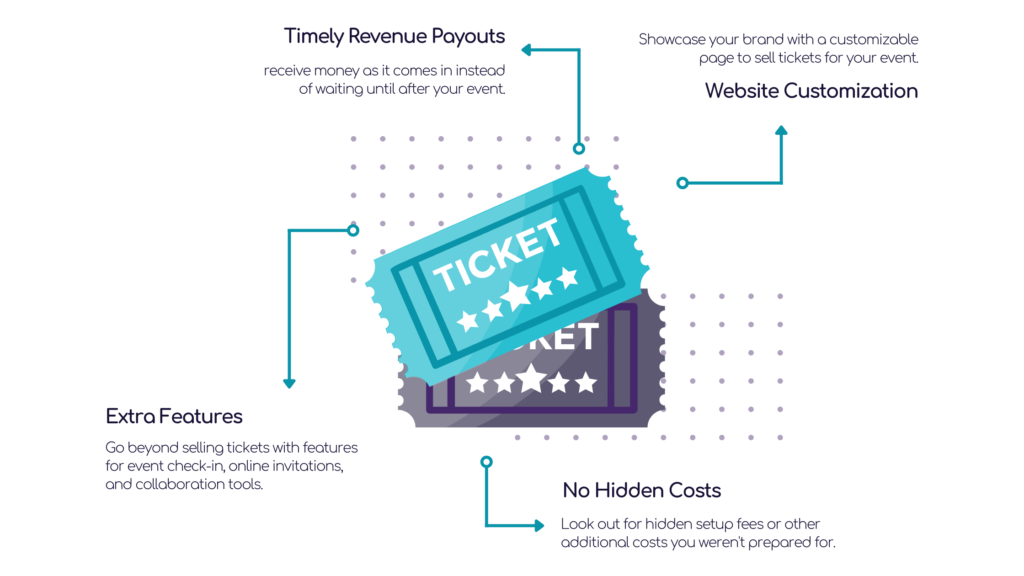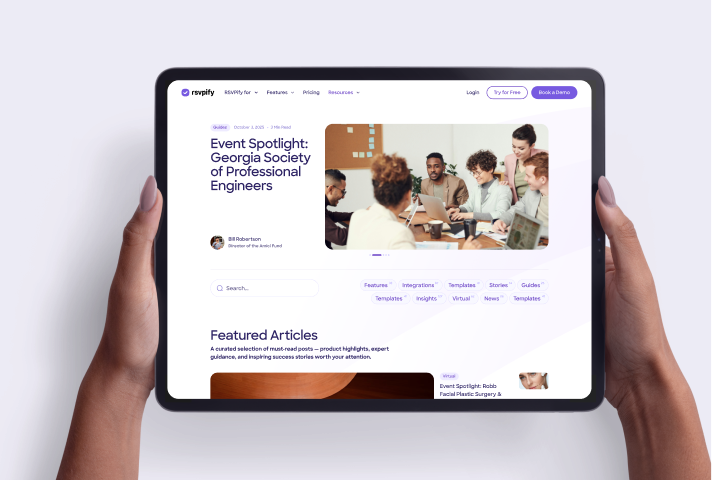Even before the COVID-19 pandemic, online ticket sales have been a fundamental feature of event planning. Ticketmaster and other concert industry vendors long ago made the transition to online ticket sales (remember the days when people lined up outside the local record store? We barely do). Quite simply, the convenience of payment and ticket distribution and ability to protect buyers from scalpers made it online ticketing websites a no-brainer.
However, as with many other things, the COVID-19 pandemic caused a significant evolution in the feature sets of the best ticketing websites. No longer just a place to buy a ticket to an event, many good ticketing platforms also offer additional features for both event planners and attendees to provide a comprehensive event management platform. However, no two ticketing websites are made the same, and finding the perfect feature set to sell tickets to your event involves some careful digging. To help you choose the best online ticket vendor for your next event, here are the ten most important features for any ticketing website to offer:
Different ticketing websites have vastly different approaches to charging fees to event hosts or passing those fees on to ticket buyers. This is often in addition to standard credit card processing fees that websites will also offload to hosts or buyers to maximize profits. For example, RSVPify charges service fee of 1.95% + .90 cents per purchase along with a standard credit card processing fee. Other vendors often charge greater percentages or flat-rate transaction fees, so it's worth comparing ticketing vendors to find the best way to keep your own costs or the costs to your attendees low.
Some ticketing websites only offer a single subscription tier, which may be expensive for a single event host or more intimate event. That's why finding an event website with ticketing software that can be purchased at different price points depending on the event and guest list size, ticketing needs, and additional feature sets is another smart thing to consider when choosing a ticketing platform.
Some ticketing software will come embedded with hidden setup fees for creating specific elements of an event, which are often not clearly publicized when you sign up or until you have already made your payment. Make sure to check the payment page closely to look for fine print around any setup fees, since RSVPify and others offer ticketing solutions without any setup fees.
In addition to selling tickets, event websites that offer event check-in through QR codes are also beginning to grow in popularity. You can assign guests specific QR codes to verify their identity and help avoid ticketing fraud or scalping, and make actual event check-in quicker and easier by simply scanning tickets digitally or printed with a phone or tablet.
For event planners looking to host corporate events or events meant to showcase your brand, having the ability to feature your own marketing and not that of your ticketing website is a major plus. For example, RSVPify offers subscription tiers with white-label options to remove all watermarks and other branded features to let you stylize your ticketing, event website, and other materials as if they were produced internally.
No matter why you sell tickets, whether to collect donations for a charity or simply to make a profit on an event, you are usually looking to collect money in a timely fashion. Whether you need to pay vendors or simply want to use event profits for other purposes, actually receiving the revenue from your ticketing website quickly is an often-overlooked but very frustrating element of different ticketing platforms. Try to find an event website that offers daily payout for ongoing revenue collection, to allow you to receive your money as it comes in.
Some of the more prominent ticketing websites offer fairly static and structured ticketing options, with extremely limited customization beyond the event schedule, ticketing price, and wording on the tickets, for example. However, some of the best ticketing websites give nearly full customization to users, from graphic design to scheduling features and other elements that let you create a fully responsive experience as you sell tickets online.
You can easily kill two birds with one stone when creating an exclusive event by finding an event management platform that not only offers online ticket sales, but also the ability to send online invitations and collect online RSVPs. Platforms like RSVPify offer these features as part of the same subscription package that includes ticketing, along with a host of other event management features like seating chart makers, mass communication options, and more. Try to choose a solution that gives you a menu of different features to handle all of your event planning online, instead of needing to subscribe for a variety of services.
Some event websites will limit access to creating your event and selling tickets to only a single user, which means needing to share an email or password among anyone who is helping to host the event. You should check your site's features page to see if you can add multiple users to an account for free (or if there is an additional charge you will have to pay) to make collaboration easier.
One of the more overlooked key features in good ticketing websites is the ability to embed online ticketing right into your own existing website. This is especially true for corporate events or events for an organization, where you may not want to redirect potential users from other important info on your website. Look to see if your ticketing platform allows you to easily embed your ticketing website without needing extensive coding experience.

About the Author
Adam Hausman co-founded RSVPify in 2013 and has been passionate about event tech and ticketing software ever since. Also founder of Greenlight Growth Marketing, he holds degrees from Indiana University (BA English/Psychology 2008) and the University of Illinois-Chicago (M.Ed. Secondary Education 2012). He lives in Maine with his wife, 2 kids, and 2 annoying cats.
On this page:
Your ticketing website should offer you more than just the tickets themselves Affordable Ticketing Fees Subscription Tiers No Hidden Costs Event Check-In Features White Label Options Timely Revenue Payouts Ticketing Website Customization Online Invitations and Online RSVP Tools Collaboration Integration with other toolsGet the latest product updates, event planning tips, and industry insights — straight to your inbox.
You can unsubscribe at any time. Your email will only be used to send RSVPify updates and will never be shared.
